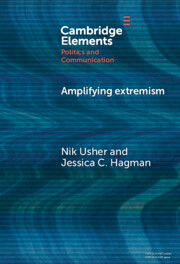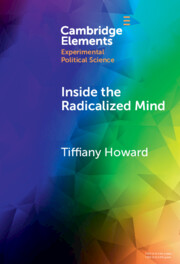Refine search
Actions for selected content:
67 results
Power and ideology – A comparison of citizens’ and politicians’ satisfaction with democracy
-
- Journal:
- European Journal of Political Research ,
- Published online by Cambridge University Press:
- 05 November 2025, pp. 1-13
-
- Article
-
- You have access
- Open access
- HTML
- Export citation
8 - Terrorism
-
- Book:
- Human Rights Law in the UK
- Published online:
- 11 November 2025
- Print publication:
- 30 October 2025, pp 364-431
-
- Chapter
- Export citation
Pragmatic rather than principled – organisational bans in democracies
-
- Journal:
- European Journal of Political Research ,
- Published online by Cambridge University Press:
- 30 September 2025, pp. 1-30
-
- Article
-
- You have access
- Open access
- HTML
- Export citation
The non-linearity between populist attitudes and ideological extremism
-
- Journal:
- Political Science Research and Methods , First View
- Published online by Cambridge University Press:
- 09 September 2025, pp. 1-20
-
- Article
-
- You have access
- Open access
- HTML
- Export citation
21 - The Psychological Consequences of Globalization and the Rise of Violent Extremism
- from Part IV - Macro-Level Perspectives
-
-
- Book:
- The Cambridge Handbook of the Psychology of Violent Extremism
- Published online:
- 31 October 2025
- Print publication:
- 07 August 2025, pp 426-450
-
- Chapter
- Export citation
The Gendered Politics of State-Sanctioned Extremism: Evidence from a Study of Buddhist Protectionism
-
- Journal:
- Politics & Gender , First View
- Published online by Cambridge University Press:
- 06 August 2025, pp. 1-32
-
- Article
-
- You have access
- Open access
- HTML
- Export citation
12 - Conclusion
-
- Book:
- Civil War and Intrastate Armed Conflict
- Published online:
- 29 May 2025
- Print publication:
- 12 June 2025, pp 386-417
-
- Chapter
- Export citation

Amplifying Extremism
- Small Town Politicians, Media Storms, and American Journalism
-
- Published online:
- 19 May 2025
- Print publication:
- 12 June 2025
-
- Element
- Export citation
Demanding more than what you want
-
- Journal:
- Political Science Research and Methods , First View
- Published online by Cambridge University Press:
- 15 May 2025, pp. 1-17
-
- Article
-
- You have access
- Open access
- HTML
- Export citation
Beyond words: decoding power structures and rhetorical legitimating categories within Xinjiang White Papers (2003–2019)
-
- Journal:
- International Journal of Asian Studies / Volume 22 / Issue 2 / July 2025
- Published online by Cambridge University Press:
- 02 May 2025, pp. 313-334
-
- Article
-
- You have access
- Open access
- HTML
- Export citation
Discounting extreme positions: party normalization and support for the far right
-
- Journal:
- Political Science Research and Methods , First View
- Published online by Cambridge University Press:
- 16 April 2025, pp. 1-9
-
- Article
-
- You have access
- Open access
- HTML
- Export citation

Inside the Radicalized Mind
- The Neuropolitics of Terrorism and Violent Extremism
-
- Published online:
- 31 March 2025
- Print publication:
- 24 April 2025
-
- Element
- Export citation
Intellectual Humility Without Open-Mindedness: How to Respond to Extremist Views
-
- Journal:
- Episteme , First View
- Published online by Cambridge University Press:
- 17 March 2025, pp. 1-23
-
- Article
-
- You have access
- Open access
- HTML
- Export citation
7 - Parties versus Democracy
- from Part II - Constitutionalization
-
-
- Book:
- The Entrenchment of Democracy
- Published online:
- 16 December 2024
- Print publication:
- 05 December 2024, pp 136-154
-
- Chapter
-
- You have access
- Open access
- HTML
- Export citation
Extremism, racism and riots: exploring the political, social and cultural determinants of poor mental health
-
- Journal:
- BJPsych Open / Volume 10 / Issue 6 / November 2024
- Published online by Cambridge University Press:
- 05 December 2024, e224
-
- Article
-
- You have access
- Open access
- HTML
- Export citation
10 - Religious Extremism
- from Part Five - The Effects of Religion
-
- Book:
- The Psychology of Religion
- Published online:
- 01 November 2024
- Print publication:
- 31 October 2024, pp 415-464
-
- Chapter
- Export citation
6 - Extremism and Exclusion
- from Part II - Drivers of the Exclusion–Extremism Link
-
-
- Book:
- Exclusion and Extremism
- Published online:
- 16 May 2024
- Print publication:
- 23 May 2024, pp 123-140
-
- Chapter
- Export citation
7 - Divided Groups, Polarized Identities, and Extremist Behavior
- from Part II - Drivers of the Exclusion–Extremism Link
-
-
- Book:
- Exclusion and Extremism
- Published online:
- 16 May 2024
- Print publication:
- 23 May 2024, pp 141-165
-
- Chapter
- Export citation
12 - Chronic Social Exclusion, Radicalization, and Extremism
- from Part III - Topics Related to the Exclusion–Extremism Link
-
-
- Book:
- Exclusion and Extremism
- Published online:
- 16 May 2024
- Print publication:
- 23 May 2024, pp 263-286
-
- Chapter
- Export citation
10 - The Exclusion–Extremism Link in Non-WEIRD Populations
- from Part II - Drivers of the Exclusion–Extremism Link
-
-
- Book:
- Exclusion and Extremism
- Published online:
- 16 May 2024
- Print publication:
- 23 May 2024, pp 212-236
-
- Chapter
- Export citation
